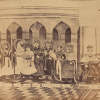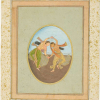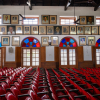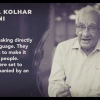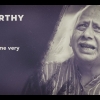The Goan tiatr has a rich history. It is 122 years old. It is something unique – a part of Goan culture. Tiatr has survived for 122 years and today, as the Tiatr Academy has been established by the government of Goa in the year 2009, tiatr is on [a] roll. The need for an academy was very much there but it took many years for the government to think [along] these terms. But finally it is here! It is for the benefit of tiatr and the tiatr fraternity.
Documentation of tiatr has been done over the years. It is one of the performing arts that is well documented. That is why we say that tiatr has a rich history. The documentation of tiatr has helped the students of research, researchers, as well as the tiatr fraternity themselves.
My association with tiatr began as a child. No doubt as part of the audience. But as I grew up, my love for tiatr grew with me. Of course my family too supported me in this field. And today if I am attracted to tiatr more than a normal tiatr-lover, it is purely because I find something really ‘Goan’ in a tiatr. It is part of our life; part of our culture. My writings on the subject of tiatr began way back in the mid-’80s. And today, I am happy that in my own little way I’ve done something to support this beautiful Goan art.
This book that you see in my hand is my fifth book [and] the first one that I have dedicated entirely to tiatr. Its title is Oxem Ghoddlem, which literally means ‘It happened like this.’ In this book, which was published by the tiatr Academy of Goa in the year 2012, I have narrated [a lot of incidents] that have taken place in the lives of tiatrists. [Incidents] true to life.
I have taken care…every time I spoke to any artists…I have told them that this is going to be a documented history so let the facts be neat and straight. As far as I know, from the thirty-one artists whom I was able to interview, all of them have done justice [in this regard]. Because when you talk about documentation, dates and years are very, very important. It has been maintained in this book.
Before I talk more in-depth on this book, I would like to share something that is very important about how [the idea of] this book came about. I was a member of the Governing Council of the Tiatr Academy of Goa when it was established in the year 2009. Somewhere in the year 2010, as part of the tiatr Academy activities, I remember there was a workshop for tiatr artists, as well as for those people who had any association with the tiatr. It was a day long workshop, held at the tiatr Academy’s conference hall [in Panjim]. It was in two sessions. The morning session was over at around 1 o’clock or so. And most of the top tiatr directors and artists and everybody who had something to do with tiatr were there.
So when the first session ended for lunch break, it was Tomazinho [Cardozo], the then [and] first President of the Tiatr Academy, who just happened to express his mind. He said, ‘We’ll have a quick lunch and for the short break that we get to relax, let’s put up something impromptu. Let us share something from [our lives]’. He said we could come up with something, sing a song, or share a joke or put up a small comedy act. Nothing that [was] rehearsed or practiced. Or you could even share certain experiences on the tiatr stage.
As I said earlier there were top directors of the Konkani stage there and senior artists too. So this idea of Tomazinho [Cardozo] was liked by everybody. And then it began! Prince Jacob, [who] was also present at the workshop set the ball rolling. He came up on stage first and said, ‘I will narrate an incident from my tiatrist life.’ I will get back to the incident a little later. But this is how it happened. So Prince Jacob was the first one who came up on stage and narrated a[n] incident [from] his life as a tiatrist. Not as a director but as a tiatrist [or in this case, an actor]. It was a very, very humorous episode – everybody enjoyed it. And it was presented ex tempore, without any rehearsal.
Taking a hint from him [Prince Jacob] and the idea, the next person who went up the stage was the Late Anil Kumar – he is no more with us. And Anil Kumar as you know is not only a good artist, a good writer, a good director, but he has got [a] style of narration. And I remember Anil Kumar once again came out with a very interesting episode in his life as a tiatrist, when he was an artist with the Late M. Boyer.
So this is how it all began [the writing of the book]. These were the first two episodes or anecdotes that were narrated by Prince Jacob and by Anil [Kumar]. Thereafter some more artists came up [on stage] – some of them sang a song, some shared a joke, somebody did a small comedy act. But if I can recall exactly, I think there were two or three more artists who [also] expressed some of their experiences. Since the time-slot was very less – about twenty minutes to half an hour – we did not continue.
It was at this time that an idea flashed in my mind. I said great! This is what I wanted. Instantly, the writer[ly] instinct in me began to work overtime. I didn’t waste any more time. I just took Tomazinho [Cardozo] aside and told him: ‘I am going to work on a book!’ He looked at me in surprise and said, ‘How come you are telling me now?’ I said, ‘I am going to work on a book in the same style. I am going to meet the artists, interview them and compile the anecdotes from their tiatrist life.’
I said, ‘If today on a short notice we could get three or four such [incidents], there would be many more who would have [many] interesting [anecdotes].’ And this was how it all happened! Tomazinho was impressed! I said, as a member of Tiatr Academy, do I [have] your permission? In principle he gave me permission. He said, “You go ahead Daniel. We will sort out the thing in writing later. But if you have this idea coming up in your mind, work on it.” So that was it.
And believe me, instantly I made up a list of artists whom I would interview and the work began. Tomazinho said go ahead and I began. So all [those] thing[s] started. Now getting the episodes documented, getting the tiatrists to talk, and especially remember the [incidents] was a task that I had to work out. I began with [a] short listing [of] a few artists, calling them up, telling them what exactly I am looking at, how I am going to work on it, and what I need from them. This was how I went about compiling the incidents and anecdotes. I would first tell them this is what I want, but be very particular about the dates, remember the director, remember the tiatr, [and] possibly the stage where you performed. These were the basic things I gave them, the rules [of what] I want[ed]. And I should say, to my good benefit, all of them obliged in the manner that I wanted.
Because compiling tiatr’s history is important for the future generation. I knew that this book would be a turning point because so far nothing like this ha[s] been compiled or written. Meeting the artists was the next challenge because I remember this was somewhere in the year 2010 and that was the time when tiatr was doing extremely well, not only in Goa but outside Goa [as well]. And I know [that] the top artists were just flying in and out of Goa, Europe, the Gulf and things like that. So getting [an] appointment with them was another big issue but somehow I managed it. You will be surprised to know that I have interviewed these tiatrists in some of the most unimaginable places.
It was not only at the place of their performance, backstage or sitting somewhere at the side – getting a few moments, talking to them, noting down. I have even interviewed the artists by calling them [to] my place [residence]. Many of them obliged. I have interviewed them at [many places]…at theaters – whether it was Kala Academy [in Panjim], or Ravindra Bhavan at Margao and places like that. I have met them in restaurants over a cup of tea and had a one-to-one discussion. I have even – for some reason – in the monsoons met them in my own car! Sitting in my car interviewing them. So this is how it all happened.
Today, tiatr documentation is necessary. A lot needs to be done. This effort of mine, Oxem Ghoddlem, is just a small effort in a vast ocean of tiatr’s history and all that lies hidden. There are many treasures that are yet to be discovered in the field of tiatr. Though there are many writers who write about tiatr, we need more writers who will go in depth into the research of tiatr work that has been done over the years, over a century. Fortunately, we have many senior tiatrists today, [one only needs] to go, sit with them and talk with them. They have a treasure within them. Someone just has to activate them and they come out with it [the stories], as I have experienced with this book.
Coming back to this book, it has got some really serious anecdotes, which give you a peep into the history of tiatr nearly 50 years back. It even talks about certain recent happenings in the field of tiatr, in the lives of tiatrists and to a large extent you come to know how things were then. What these tiatr artists have gone through in the ’50s and the ’60s and the years thereafter. It has not always [been] a smooth sail; there have always been ups and downs. They have gone through many things. So I have made a concerted effort to [get] some things on record.
One more thing that I would like to tell you [is that this] book has received a good response from the readers. Because what it contain[s] [is] something that people did not know for so many years. It was always within [confined to] the artist himself and this book tried to bring it out.
Now coming back to the incident, as I had told you, what Prince Jacob narrated [was] something very humorous. Prince Jacob was performing for Rose Ferns’ tiatr Tapott [Slap]. Tapott is a hit tiatr, a non-stop show and Prince Jacob was a comedian in that tiatr. With him was another comedian called Baker.
This tiatr was [being performed] in the neighboring state of Maharashtra, somewhere in a remote area called Reddi, just across our border. This show was late in the evening. They performed and as Jacob tells me the show was good. Being a distant place perhaps they did not think it wise to drive down to Goa back again in the deep of the night. So they must have spent the night there. The next morning before leaving, Jacob tells me he had an upset stomach and [the] same thing with his co-artist, comedian Baker.
So Jacob said we just decided why should we hunt for a toilet facility when we are strangers here? Nobody knows us, [we] might as well go and answer nature’s call out in the open on the banks. There was a river flowing and there was a narrow stretch of road. So early morning they both set out and squatted there with the hope of fulfilling their urgent need. What happened was there was a boatman at a little distance, who saw Prince Jacob and Baker sitting by the roadside on the bandh – that is the narrow stretch of road. And his instant reaction was that he called out loudly and [said], “See, see yesterday’s comedians from the tiatr, both are sitting on the roadside there and answering nature’s call!”
Jacob said the moment we heard it – Oh hell! He said, “This man must have been [there] for the tiatr last night. Today early morning he has recognized us, and that is why he is making a big hue and cry about it. There was no other option left [for] us. We immediately stood up and pulled up our pants and there was nothing that we could do. We just ran for our lives, back to our bus.” So that is it.
But the main gist of the whole thing is as Jacob expressed, being artists the moment you perform on stage you get recognized. Your face is recognized out in the public. And this is exactly what happened to Prince Jacob and Baker that morning. He said we thought nobody would know us but the very fact that we had acted in the tiatr the [previous] night, this stranger who was there with his canoe in the river recognized [us] and tried to make a big issue of it. So this is the incident that he narrated and that is what led to Oxem Ghoddlem. This and many more [incidents] are part of this book.
One more thing I have noticed while I was interviewing the artists [is that] they were very happy that someone had thought about compiling these types of incidents. Some of them asked me for some time to recollect, specially the dates. And one thing [that] is appreciable [is] that most of them took care that even if they had not remembered the dates and the venue they would cross-check with their colleagues and tell [me] exactly when this particular incident happened and where it happened. So, as far as this is concerned, care was taken to maintain the dates and the location.
You must have heard the hit song of Antonette Mendes, Pitti Pitti Mog. It was recorded a couple of decades ago but it is a hit till today. When I was interviewing Antonette [Mendes] for this book, she narrated to me this incident about how that song Pitti Pitti Mog came about. It’s really interesting and till the time she expressed this thing [incident] to me, I don’t think anybody knew about it. After I compiled [it] in my book many people would read it and they would know about it. I would like to share that particular incident that happened in the life of Antonette when she recorded the song Pitti Pitti Mog.
Antonette was quite young then and as you know she has a beautiful voice, which is her greatest gift. At seventy-plus, the voice is still raging at [a] very high octave. Chris Perry offered her an assignment to sing in his audio album and Antonette was called for recording in the studio on a given date at ten-thirty in the morning.
So as requested, Antonette reported at the studio at ten-thirty in the morning. And Chris had told her once you come to the studio I will give you the lyrics of the song. When she reached the studio, Chris was there, but he had still not given the lyrics to her. So she sat there patiently, thinking he would give the lyrics but till 1 o’clock Chris had not given the song lyrics to Antonette.
It was time for lunch break and they dispersed for lunch. It was at this time, Antonette tells me, Chris Perry’s brother – that is Paul Perry – asked him, “Chris when are you going to give the lyrics to Antonette? She’s here to record the song for you and you have still not given [her] the lyrics”. So at this, I believe, Chris in turn asked his brother, “What song do you want me to give to Antonette? On what topic should she sing, in other words?” Paul knew Antonette very well. So, he suggested, “Let us sing a song on love. Give her a song on love.” So I believe that Chris said, “Oh, if that is the case, I will give her a romantic number to sing.”
That was it! And After some time Chris came with the lyrics of the song Pitti Pitti Mog. He gave her the lyrics, the tune and the melody. And as Antonette tells me, this song was recorded that day itself. Within no time, she went through the lyrics, picked up the melody, the tune, everything and the song was done at one go in the studio on the very same day. This is one incident of the song [making of the song] but see here the genius and the intellect of this Goan legend, [the] Late Chris Perry. And if you have heard the song and the lyrics, it is a hit till today. A favorite of the young and the old and when it comes from the beautiful voice of Antonette Mendes it makes an even bigger difference.
I don’t think till the time this particular anecdote was narrated by Antonette, recorded and compiled in this book, we knew anything about the history that went behind the song Pitti Pitti Mog.
Our tiatrists have gone through lots of ups and downs, those who have served the stage before Liberation and after Liberation [before and after 1961, respectively] too. Today we are living in a modern world – the communication, the transportation, everything has gone beyond everyone’s imagination. Today’s tiatrists are a blessed lot. But those who served the tiatr stage, say in the early ’60s and beyond that in the ’70s, were not so lucky enough to get all the facilities that we enjoy now.
You will be surprised…there’s another incident that I have compiled in this book on the veteran and senior tiatrist Marcelin de Betim. Marcelin de Betim as you know is a satirical singer who sings political songs as well as comedy songs. Of late he is not seen much in tiatrs because of the age factor and because of his ill-health. But there was a time [when] Marcelin was a much sought after singer in all the tiatrs staged by all the senior tiatrists.
There is a very, very interesting and humorous anecdote that he shared with me when I was compiling this book. The incident goes back to the ’70s or thereabouts, you know when M. Boyer was staging his tiatr, Ekuch Kazar [The Lone Wedding, see also the handbill section]. Ekuch Kazar was staged in Arambol. Arambol was the place across the river after Siolim. You have to cross from Siolim to Morjim and then go to Arambol across the river. Now we have a bridge there but at that time there was no bridge. So there was a performance of Ekuch Kazar of M. Boyer at Arambol.
And as Marcelin tells me, this show was a hit and everyday they had a performance – a night show, late in the evening. It’s not like now where the last show [for the day] is at seven-thirty.At that time shows would be as late as 10 o’clock in the villages. So they had shows every day and as Marcelin de Betim mentioned, for thirteen days they were having consecutive shows, one after the other. Marcelin was an artist who not only performed in tiatrs as a professional, but [also] had his own job with a private company.
He was performing at tiatrs at night and at the same time next morning he would go and join his duty. So he tells me that there was hardly any time to take rest. It was performance, a short nap and then back to work. Then again by seven they had to leave the place because they had to travel by bus. Once when they were performing at Arambol, when the show was over they took the ferry to come over to Siolim. He [Marcelin de Betim] and Anil Kumar both sat together. Unfortunately, Marcelin dozed off in the ferry and by the time it crossed from Arambol ramp to the other ramp on the Siolim end, he fell fast asleep.
When the ferry touched the other side the artists got off the ferry and his colleague Anil Kumar too got up and walked [away]. They all went and there was another bus waiting for them at the other end. They sat in the bus and left. Somewhere they realized that Marcelin was missing! And they came back to the ferry ramp. Now at night the ferries have limited trips, so the ferry had already left the Siolim ramp and was on the way back to [the] Morjim side.
So they had to blow the horn and flash the lights, signaling the ferry to come back. That was the way they would normally attract the [attention], there were no mobiles, mind you. They had to flash the headlights and give a kind of warning to the ferry-captain to bring him back. The ferry was brought back to the Siolim ramp and then someone came in the ferry looking for Marcelin. He was still fast asleep on the bench! They woke him up and brought him out and then he boarded the bus. And happily thereafter they came back home in the morning.
So these are the [incidents] you know, that tell you lot about tiatr. Not only [does] this incident talk about his [Marcelin’s] tiredness, fatigue and sleeping, but it [also] tells us how these artists have lived their lives as tiatrists. How they have faced all the odds and the difficulties that came with it. Luckily, today’s tiatrists drive to the tiatr venue in their own cars. We have access to communication by way of mobile connectivity. This was not there then. Some of the artists didn’t even have two-wheelers. They used to walk from one place to the other.
This is one reason I say [a] lot of tiatr’s history still remains undocumented. We need writers – not only writers [but] even a person who has a passion for tiatr can take up this work of documenting tiatrs: tiatr’s history, tiatr incidents [and] the life of tiatrists. When I was doing this book, I came across such things in a very different manner. When I say different manner, what I mean is – what I found in them when they were narrating these [incidents] is that there was a lot of passion. Instantly, they were going back in time and they were actually reliving the experience [of] what happened at that time. That was the beauty of these artists when I spoke to them.
I had the pleasure of meeting, talking, and interviewing Ophelia Cabral e D’Souza, one of the senior most artists, who is called the ‘Tragedy Queen’ of the Konkani stage. She is a marvelous artist and a gem of a person. Very warm [and] affectionate. She was very happy that I’d come to meet her and talk to her and she had a few things to share with me.
As you know, Ophelia [Cabral] was the main stage artist of most of the senior directors of the Konkani tiatr stage. She narrates to me an incident that happened way back in the year 1973. It was about an injury she suffered while acting on stage – quite a serious injury – and how she went through it, how the entire incident was managed and the tiatr without much interruption went forward.
It happened in the year 1973. It was a tiatr directed and staged by Late M. Boyer, Bhurgim ani Bhangar [Children and Gold]. In this tiatr, she [Cabral] had the main role. It was a beautiful tiatr, which practically spoke about the value of a child in the family, compar[ing] it with gold, something like that. In one of the scenes Ophelia had a role which she enacted very fiercely. She just loses all self-control, goes about breaking whatever is in [front of] her around there, including the light fixtures, throws a lot of things from the tabletop, everything. She just goes berserk! And when she does this and is over with this, she had to jump from the first floor down. They showed a house that had an upper floor and she jumped from the top.
Now this particular tiatr, I believe, was performed several times and there was [a] certain arrangement made for her to jump from the top to the ground on the stage. But it so happened, on that day this arrangement of keeping a mattress-cushion [which would take care of her fall] was for some reason not managed or set up. It could be forgetfulness on [the] part of the stage managers or the backstage artists or something like that. And she said, “I did my role [of] going out of control, breaking everything, the fixtures and all, [and then] I just went to the spot where I normally go and I jumped down.”
When she jumped down she found herself landing on the hard surface of the stage, on the floor. There was no matting – no mattress to support and cushion her fall. And in this fall she injured herself so badly that she could not continue that role. [Despite] her discomfort and the pain that she was [experiencing], somehow she continued for a while but then she had to take a break. And M. Boyer, she said, noticed that she was in discomfort and immediately called to [halt the show] or suspend the tiatr and the curtain was brought down.
She said, immediately a doctor was summoned and when the doctor came he examined Ophelia, saw that the injury was quite painful and she was administered a painkiller. It was only after the painkiller began acting on her, after about 10 to 15 minutes, that she resumed back and played that role from wherever it was stopped and continued the tiatr till the end. Now these are the small incidents that make up the life of tiatrists. It’s not always a bed of roses, as you would say. They go through all kinds of pains and sufferings [in] the profession.
There’s another incident that Ophelia narrated to me and this was during the staging of the tiatr, Besanv [Blessing]. This incident takes us back to the days of the Liberation in Goa [December 19, 1961] from the Portuguese by the Indian army. She said that the show Besanv was staged at Agacaim and it was held late evening on December 18, 1961. The show started as normal, at [the] normal time. The show was progressing, but all of a sudden – when the show was on – they heard a lot of explosive sounds, explosions taking place.
First they were mild and later they [got] little louder. And as the play was progressing, the explosions and the sounds became bigger and louder. Ophelia says, “I was playing the role, a very tragic role opposite the veteran artist, A.M.B. Rose.” The role was such that she was mourning the death of her son. She had lost her husband earlier, and in that particular scene opposite A.M.B. Rose, she was mourning for her son. She recalls that A.M.B. Rose was doing [playing] a role of a paralyzed man and he couldn’t walk [as] he was in a wheelchair.
At one point of time when the show was going on, the explosions were so loud, it was really distracting her. She said, “I could not do anything. I had to concentrate on my role more because I was expressing the sentiment, the emotions of a widow and at the same time mourning for my son who [had] passed away. But for some time only I could continue with it and thereafter I could not do it anymore because the sounds were getting louder, bigger, and closer. Finally we had to stop the tiatr and bring the curtains down. Thereafter, all the artists quickly packed their things and we had to leave.” It was only early next morning that they realized that Goa was liberated from the Portuguese rule when the Indian army walked into the Goan territory from the northern border. So this is one incident that actually takes us back in history.
I was able to talk to just about thirty-one artists, of which – I think – nearly about ten of them are senior artists, who have served the stage from pre-Liberation times and thereafter like Sabina, Master Vaz, Titta Preto [and] John Claro. These are the senior artists who have served the stage for many years. I was able to get many things out of them and sometimes the [incidents] that they have narrated help us walk down memory lane and to walk down the lanes of history – of Goa and [the] history of tiatr.
Coming back to Prince Jacob: now you all know that Prince Jacob is one of Goa’s top-most directors. I always call him the showman of [the] Goan tiatr stage. And he has kept up his reputation till today. He is a comedian but you will be surprised [to know] how he decided to be a comedian and remain one till today.
The story goes something like this – [as] Prince Jacob narrated [it] to me and is documented in this book – the reason behind him becoming a comedian. I understand, he was playing a role in Rose Ferns’ tiatr, Akant [Terror]. As you all know, Prince Jacob was first part of Rose Ferns’ dramatic troupe. He was a comedian but in this particular tiatr, he was playing a ‘decent’ [serious or non-comic role (?)] role. And [for] this ‘decent’ role of his one of his scenes demanded that he play[s] a very tragic role when his father dies.
The scene depicts the death in the family and he is supposed to be crying at his father’s funeral over the dead body. And Jacob says, “I was crying very bitterly for having lost my beloved father. It’s a very serious scene, a very tragic scene, but what I felt was the audience instead of sympathizing with [this] sad incident in my life…was having a hearty laugh!” Now you can’t imagine this. An actor is playing a serious role, there’s a dead body lying there, he is crying and the audience is laughing.
He says, “This was the turning-point for me. It was then that I realized that I am not cut [out] for ‘decent’ roles. People have accepted me as a comedian and they want to see me as a comedian in tiatrs. And that is the time I made up my mind that I will do only comedy roles.” So this is the incident that Jacob opened up [about] when he was talking to me in respect of this book. Perhaps, nobody would have known it till then. It was only this book that prompted him to narrate this particular incident and how he became a comedian and not a ‘decent’ tiatrist.
There is another incident that I want to narrate to you from this book, which is once again a very interesting one. Though it just happened like that [spontaneously], but it was taken in such a spirit by the audience that it raised the bar of the tiatr and the story itself. This story or this episode is narrated by none other than Tomazinho Cardozo and it is from his tiatr, Zhogzoghta Titleim Bhangar Nhoi [All that Glitters is not Gold]. This incident relates to a cat that made its entry on the tiatr stage when the show was being performed live.
The story of the tiatr, I believe, was based on a poor farming family. A farmer sends his younger brother to Kuwait to earn his living, while back home in Goa he toils to make his living on his fields. And there is one particular scene, Tomazinho said, that shows a house scene wherein the husband and wife are having their canji – canji is that rice gruel that Goans normally have. And if you go down to the villages in the traditional style, one would find in a farming family [that] they would squat down on the ground and help themselves to the canji in a bowl.
So this was the scene in the typical traditional style shown on stage where the husband and wife are sitting down and having their canji on the floor. Canji is best had with salt fish as accompaniment or even some pickle. In the scene they had a salt fish [piece that] they were having together with the canji. And at this time, Tomazinho says a cat made an entry on the stage. It was just a natural [spontaneous] happening, all of a sudden.
But it so happened, the artist on the stage was Volley de Mello, one of the main stage artists of Tomazinho’s dramatic troupe. He [Tomazinho Cardozo] said, he [Volley de Mello] had the presence of mind – he deviated from the script and broke a piece of the salt fish that he was having and offered it to the cat! The cat responded as spontaneously, naturally as the salt fish give[s] a beautiful flavor and fragrance, and came running to him took the piece of salt fish from the artists’ hand and went across the stage and went [away] inside.
After the cat took the piece and went away, the scene ended. But the audience was so impressed with that particular scene that some of them came backstage and they happened to tell Tomazinho, “What a scene that was! Was the cat really a part of the scene?” Tomazinho, I believe, kept the thing to himself and it was accepted by the audience that it was a real cat and was trained to come into the act.
This incident, I myself found very interesting and anybody would because the cat stole the limelight and was the hero of the particular scene. This and many such [incidents] are documented in this book and as I said these are the small treasures that have remained uncovered so far. I was only able to interview thirty-one artists. There are many, many more. And these artists whom I interviewed are only the actors, directors and playwrights. I am moving on to the second stage of this book where I would include even the backstage artists, including the musicians and many others who are related to tiatrs. It’s a wide field. It is not only the tiatr artists, writers, actors and the playwrights who make up the tiatr family; there are many backstage artists who don’t come into the limelight. I have already started the work on the second part of this book, a sequel to this. And there I will even meet the artists who are performing backstage, including the musicians. They have got many things to narrate and this will enrich the history of tiatrs further.
I would like to narrate yet another incident of the two comedians Humbert and Prince Jacob. Now these brothers, as you know, they are always performing as a comedy team in their tiatrs. This was somewhere in 1987 and as you know when Humbert performs he puts his heart and soul into the act. He is completely in command and control of himself.
This incident is narrated in this book and it goes something like this – when the artist fell off while dancing from the stage [on]to the band [in the pit] down below. It was the year 1987 and the show was Painnem (Cradle). This show, I believe, was staged in Thivim and Painnem as many of you know was a big hit. If I am not mistaken it had crossed a century mark [of performances]. It was a big hit not only for its story but for the comedy as well. And in this tiatr, Prince Jacob and his brother Humbert were singing a duet, characterizing [playing the role of] a kunnbi [people believed to be the original inhabitants of Goa and who form the laboring-classes] and a Hindu woman, respectively.
This song, I believe, had a lot of singing and dancing and while they were performing on the stage at Thivim – the stage was a little narrow – Humbert did not have the presence of mind to take it in [judge] first. So he was dancing to his heart’s content to the beat and the drummer was Abdonio Rodrigues. He [Humbert] says that he was in such a trance of singing and dancing to the beat of the music, he landed straight on the cymbals of the drummer. He said, thank God, the rod did not poke him. He did get hurt, no doubt.
What was most interesting and amazing was [that] people in the mattov (it was an outdoor show) were so happy, they were laughing uncontrollably thinking that [this] was part of the song or duet. But he says, I misjudged the stage and fell off. But the best part is this, when he fell down it was not the end of the duet there was yet another verse or chorus to be sung. He says, “I was in total pain but yet I had to gather my courage, get myself together, go up on stage and perform and finish the duet.” So these are the small things you know in the life of a tiatrist. Anything can happen at any time.
And before I wind up, I would like to share another incident that happened in the life of Joe Rose. Joe Rose, as you know, is a good character artist, a good composer, a good actor, and everything. He is presently the Vice-President of the Tiatr Academy of Goa. This incident happened while he was performing in Mumbai. The tiatr’s name is Aiz Hanv, Faleam Tum. And in this particular scene he is seated on a wheelchair. The other actors who are in the scene are Annie Quadros and Prince Jacob.
Now Joe Rose, though he is sitting on a wheelchair, is supposed to be dead and there is a dialogue between Annie and Prince Jacob. Humbert is also a part of the scene and the dialogue – Joe Rose tells me – is a long dialogue between the two. He is supposed to be dead and is not supposed to do [make] any movement. But see the predicament that he suffers on stage, this dead man that is Joe Rose in the act. What happens is while the act is on and Humbert is somewhere close to him, Humbert says, I heard Joe Rose whispering to me: “Aré, please come closer and cover me up”.
Now Humbert did not know why he was asking him to cover him up. But yet, [he says] “I came a little closer and tried to cover Joe Rose. I covered him, and I have to act my role out. You see, I cannot be covering him by standing [right] there and I began acting my role. After some time again he was whispering to me: Humbert, please come and cover me up. I don’t know what is happening. He is supposed to be dead and why is he asking me to cover him up? I came and covered him up again. When the scene ended, I came and asked him [Joe Rose] backstage, ‘Joe what happened to you? You were supposed to be dead, why were you asking me to cover you up?’”
It so happened that while Joe Rose was acting the dead man’s scene a fly was playing around his face and sitting on his nose! Now you can imagine when a fly sits on a nose what will happen, it tickles you, am I right? So the same thing happened to Joe. Now when Joe is acting a dead man how can he raise his hand up to swat the fly to drive it away? The best thing would be to ask him [Humbert] to cover him up. So when Humbert covered Joe up, he quietly drove the fly away. But that fly was not happy doing it once, he came back and sat on his nose…again. So he had to request Humbert once again to cover him up. And he did it again and drove the fly away. So these are the [incidents] that happen on stage. This is an emergency kind of a thing [situation]. Because Humbert covered [him], Joe Rose could lift his hand up to drive the fly away, he could release himself from the tickling sensation.
This transcript is an edited version of the original video presentation



